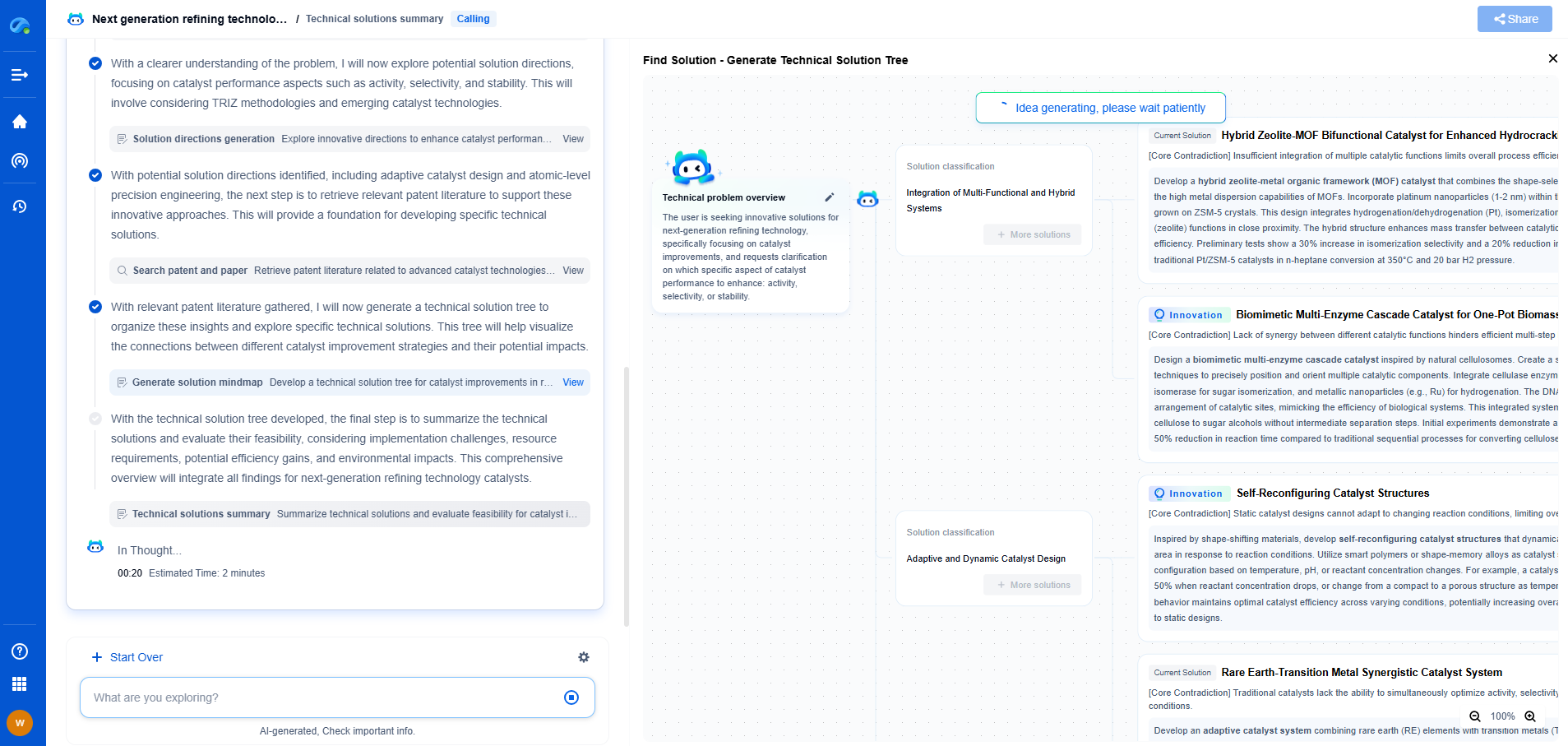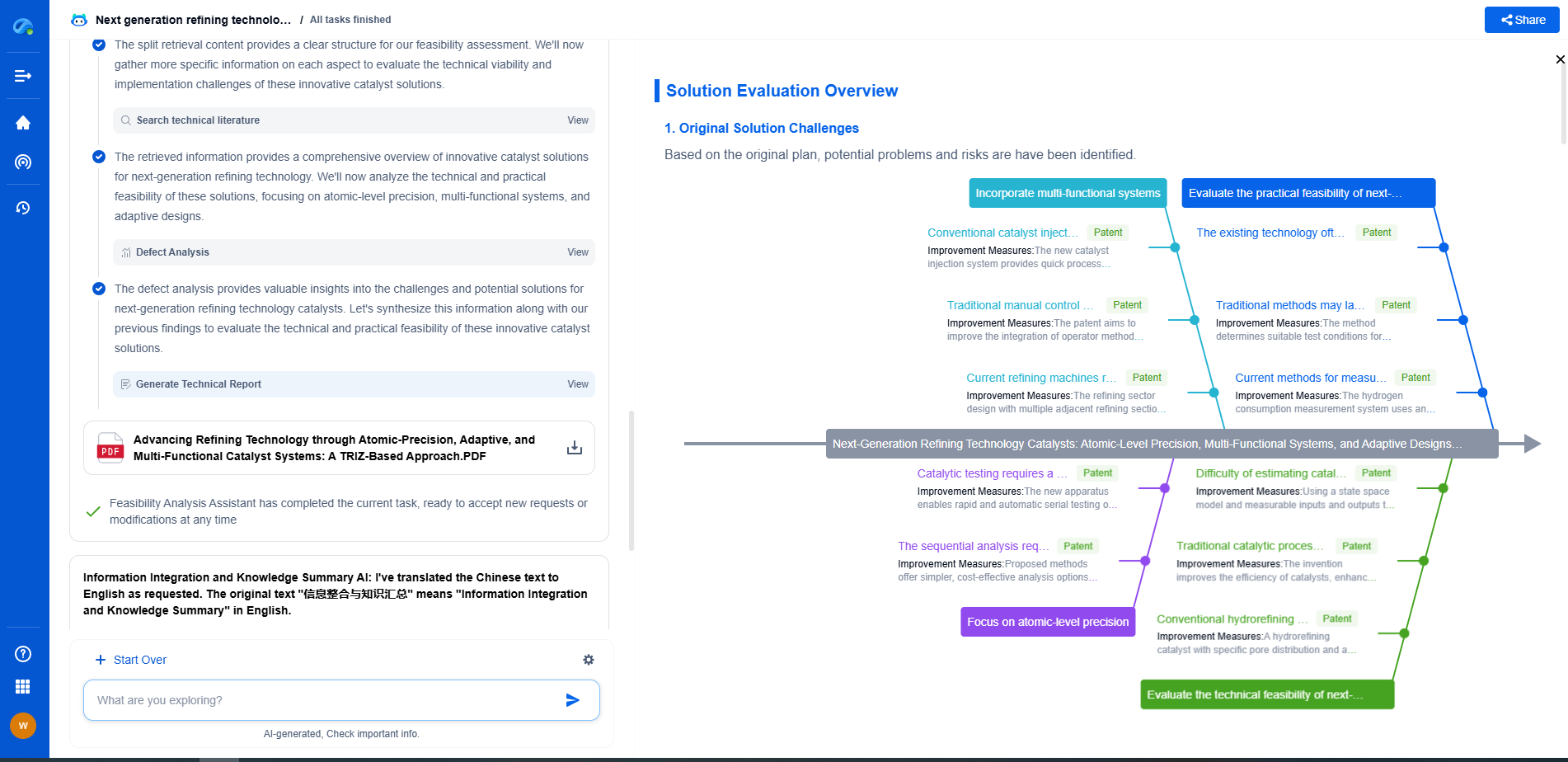What Are the Key Standards for Polymer Testing in Automotive Applications?
JUL 3, 2025 |
Understanding the Importance of Polymer Testing
Polymer testing is crucial in the automotive industry to verify that materials meet the required specifications for performance, safety, durability, and environmental impact. Rigorous testing helps in identifying the polymers that can withstand the harsh conditions of automotive environments, such as extreme temperatures, mechanical stress, and exposure to chemicals. By adhering to standardized testing protocols, manufacturers can ensure consistency and reliability in their products.
Mechanical Testing Standards
Mechanical properties are critical for determining how a polymer will perform under stress. Standards developed by organizations like ASTM (American Society for Testing and Materials) and ISO (International Organization for Standardization) detail test methods for tensile strength, impact resistance, and flexural properties. ASTM D638 and ISO 527, for instance, are widely used for assessing the tensile properties of plastics. These tests help in understanding how polymers will behave when subjected to forces in real-world automotive applications.
Thermal Testing Standards
Polymers in automotive applications often face extreme temperatures, making thermal testing essential. Standards such as ASTM D3418 and ISO 11357 cover the determination of thermal transitions in polymers, including melting temperature and glass transition temperature. These tests ensure that the polymers can maintain their integrity and performance under varying thermal conditions, which is especially crucial for parts like engine components and interior trim that experience significant temperature fluctuations.
Chemical Resistance Testing
Automotive polymers are frequently exposed to aggressive chemicals such as fuels, oils, and cleaning agents. ASTM D543 is a standard test method for evaluating the resistance of plastics to chemical reagents. This test helps in understanding how polymers react to prolonged exposure to specific chemicals, ensuring that there is no degradation in their performance, which could lead to safety hazards or reduced durability.
Flammability Testing Standards
Safety is a paramount concern in the automotive industry, and flammability testing is essential to ensure that polymer materials do not contribute to fires. Standards like FMVSS 302 (Federal Motor Vehicle Safety Standard) specify the flammability requirements for materials used in the occupant compartment of motor vehicles. These tests assess how quickly a polymer ignites and how it behaves once ignited, providing critical data to enhance passenger safety.
Environmental Aging and Weatherability
Polymers used in automotive applications must withstand prolonged exposure to environmental factors such as UV radiation, moisture, and temperature cycling. ISO 4892 and ASTM G154 are standards that describe the testing methods for determining the weatherability of polymers. These tests simulate real-world environmental conditions to predict how materials will age over time, ensuring long-term performance and aesthetic stability.
Conclusion
In conclusion, polymer testing is an essential component of the automotive manufacturing process, ensuring that materials meet stringent safety, performance, and durability requirements. By adhering to established standards, manufacturers can guarantee that their products are fit for purpose and capable of withstanding the demanding conditions of automotive environments. As automotive technology continues to advance, the importance of rigorous polymer testing and adherence to these standards will only grow, supporting innovation while safeguarding consumers.
Transform Polymeric Innovation with Patsnap Eureka
From biodegradable polymers to high-performance composites, the world of polymeric compounds is evolving faster than ever—driven by the demands of sustainability, functional customization, and global IP competition. Whether you're exploring novel copolymer architectures, optimizing polymerization techniques, or tracking material patents in bioplastics, time-to-insight is everything.
Patsnap Eureka, our intelligent AI assistant built for R&D professionals in high-tech sectors, empowers you with real-time expert-level analysis, technology roadmap exploration, and strategic mapping of core patents—all within a seamless, user-friendly interface.
Whether you're working on next-gen packaging films, bio-based resins, smart polymers for electronics, or new thermal-resistant composites, Eureka accelerates your journey from idea to patent to product—with unmatched clarity and speed.
🔍 Experience how Eureka can power your polymer R&D with AI intelligence—start your free trial today and unlock the future of materials innovation.
- R&D
- Intellectual Property
- Life Sciences
- Materials
- Tech Scout
- Unparalleled Data Quality
- Higher Quality Content
- 60% Fewer Hallucinations
Browse by: Latest US Patents, China's latest patents, Technical Efficacy Thesaurus, Application Domain, Technology Topic, Popular Technical Reports.
© 2025 PatSnap. All rights reserved.Legal|Privacy policy|Modern Slavery Act Transparency Statement|Sitemap|About US| Contact US: help@patsnap.com

